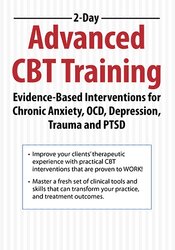🎁 Exclusive Discount Just for You!
Today only: Get 30% OFF this course. Use code MYDEAL30 at checkout. Don’t miss out!
With Deb Dana’s practical guidance, it’s now possible to get beneath symptoms and show clients how to safely listen to the “story” of their autonomic nervous system and to re-shape their experience toward safety and connection.
Deborah Dana – Putting Polyvagal Theory into Practice: Nervous-system based Exercises for Anxiety, Depression, Trauma and more

At the heart of our client’s symptoms – from anxiety and depression to traumatic stress and more – is a dysregulated nervous system.
Polyvagal theory finally presents a clear roadmap of our nervous system that can guide both therapists and clients to the source of their most troubling symptoms.
And Polyvagal-informed treatments provide interventions that not only empower clients to understand how their nervous system shapes their experiences, but also gives them powerful methods to re-shape those experiences in therapy.
Watch Deb Dana, the world’s foremost translator of Polyvagal theory into clinical practice, in this all-new training based on her best-selling book Polyvagal Exercises for Safety & Connection as she shows you, step-by-step to:
- Track a client’s experience through their autonomic nervous system and uncover the specific places that keep them stuck
- Interrupt and re-shape habitual autonomic patterns that cause their emotional suffering, maladaptive thoughts, and un-helpful or impulsive behaviors
- Learn how to introduce Polyvagal practices in session
- See and experience real demonstrations
With Deb Dana’s practical guidance, it’s now possible to get beneath symptoms and show clients how to safely listen to the “story” of their autonomic nervous system and to re-shape their experience toward safety and connection.
Understanding the human nervous system through a Polyvagal lens has been a game-changer for therapists across modalities. There is no better way to learn it than through experiencing it yourself in this highly practical, intervention-rich training.
Purchase today!
Objectives
- Propose language to successfully introduce nervous system-based interventions with clients.
- Evaluate the five phases of the BASIC approach to polyvagal-informed treatments.
- Apply one exercise from each phase of the BASIC approach.
- Assess timing of moving between phases with clients.
- Construct practices between sessions to successfully shape new autonomic patterns.
- Utilize personal progress trackers to assess client progress.
Outline
How Polyvagal Theory Provides a Foundation for Lasting Therapeutic Change
- The BASIC approach to Polyvagalinformed treatment
- Trauma healing from a Polyvagal theory perspective
- Learning to stretch, but not stress, a client’s nervous system
- Co-regulation: An imperative in psychotherapy
Introducing Nervous System-Based Interventions to Clients
- The three-part hierarchy of the autonomic response
- Neuroception: our internal surveillance system
- How early experiences and trauma shape our nervous system
Befriending Practices: Building Awareness & A Map of the Nervous System
- Exploring Hierarchies
- Identifying landmark moments in our nervous system
- Recognizing ventral vagal “anchors”
- Utilizing the social engagement scale
- Creating a neuroception notebook
Attending Practices: Creating Stability in the Nervous System
- Building attention through naming autonomic states
- Daily tracking practices
- Attending over time
- Savoring practices
Shaping Practices: Creating New Patterns & Pathways in the Nervous System
- Moving out of dorsal vagal collapse and sympathetic activation
- Neural exercises for creating resilience and psychological flexibility
- The power of utilizing autonomic imagery
Integration Practices: Writing a New Story in the Nervous System
- Establishing new autonomic patterns and behaviors in life
- Moving from intention to action
- Learning to engage the vagal brake
Connection Practices: Finding Safety in Connection Through the Nervous System
- Exercising and strengthening the social engagement system
- Learning to feel safety in connection
- The reciprocity equation
- Creating a personal connection plan
Using Personal Progress Trackers That Can Improve Outcomes
- Tracking the flow of a Polyvagalguided session
- Polyvagal-guided assessment and treatment planning
Target Audience
- Counselors
- Social Workers
- Psychologists
- Case Managers
- Addiction Counselors
- Physicians
- Therapists
- Marriage & Family Therapists
- Nurses
- Other Mental Health Professionals
Course Features
- Lectures 0
- Quizzes 0
- Duration 10 weeks
- Skill level All levels
- Language English
- Students 125
- Assessments Yes





